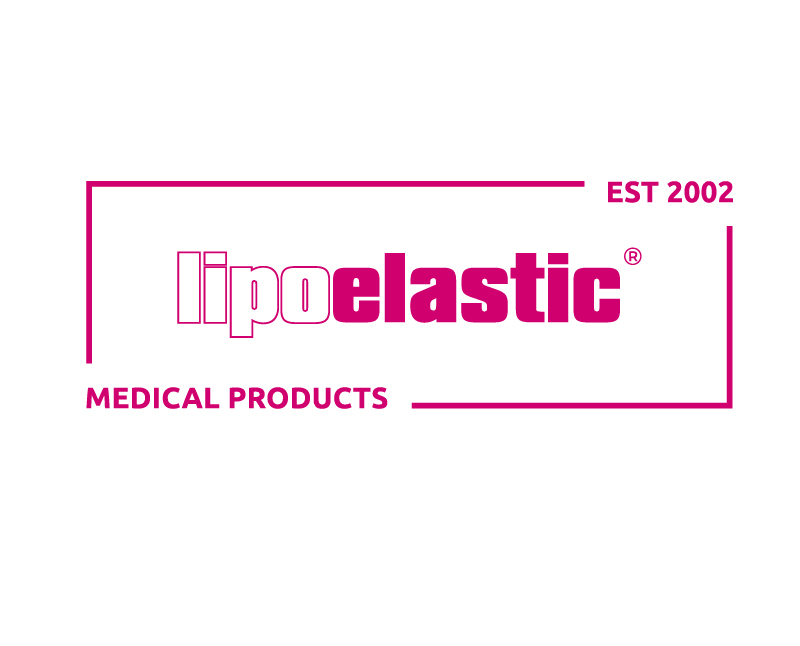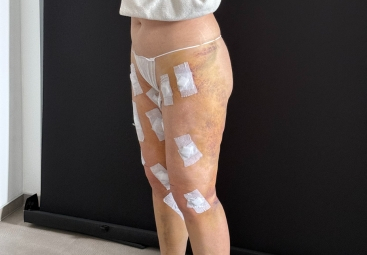I’m Sylvie, Marketing Manager for LIPOELASTIC France, and I recently underwent surgery to treat lipoedema in my thighs and the backs of my calves.
After sharing the details of my surgery in a previous blog post, today I want to talk to you about my recovery and the different steps on the road to healing.
Nutrition During Recovery After Lipoedema Liposuction
Following my operation, I focused on a healthy, varied, and anti-inflammatory diet to support recovery. On the menu:
- Plenty of fresh fruits and vegetables
- High-quality proteins (eggs, tofu, soya, legumes)
- Whole and unprocessed foods
I avoid industrial and ultra-processed products as much as possible. My aim was to give my body everything it needed to heal and regenerate.

I also take iron supplements, drink plenty of water throughout the day, and lymphatic tea to support the lymphatic system. Additionally, I take supplements containing herbs, vitamins, minerals, and flavonoids for light legs, as well as arnica in pellet form.
Lymphatic Drainage: A Key Step
After the surgery, lymphatic drainage became an essential part of my recovery routine. It helps:
- Stimulate lymphatic circulation
- Reduce swelling
- Eliminate fluids and toxins
- Relieve heaviness in the legs

From the very first day of recovery, I had a reflexology massage. Then I received four manual lymphatic drainage sessions during the 10 days I spent in the Czech Republic, where I had my surgery. Each session lasted between 1.5 and 2 hours, and the first one also included 1 hour of pressotherapy.
At the end of each session, I felt relieved, lighter, and more mobile. After the first massage (on day 3), I was even able to walk for 30 minutes, which was very reassuring! Once back in France, I continued with two lymphatic drainage sessions per week for two weeks, then once a week until I no longer felt the need.
Infrared Light to Promote Healing
During my 10-day recovery in the Czech Republic, near the GIA Clinic where I had the surgery, I was fortunate to have 3 one-hour sessions of infrared LED light therapy at the GIA Clinic.
This technology is known for its benefits for the skin and healing. Infrared light penetrates deep into the tissues and helps to:
- Stimulate collagen production
- Accelerate cell regeneration
- Reduce inflammation
- Improve blood and lymphatic circulation
These sessions were a real bonus in the healing process. I felt relaxed during the sessions, and they likely contributed to my overall recovery.

Pain After Lipoedema Liposuction
I was lucky not to experience significant pain during my recovery. Even the removal of the post-op compression garment, which some people fear, went smoothly for me.
That said, I want to emphasise that each person experiences this differently, and my story is just one example. If it can reassure or guide you, then sharing it has served its purpose.
Postoperative Sensations
For about two weeks after the procedure, the main discomfort I felt was a burning sensation in my legs, especially when standing up. It wasn’t unbearable, but noticeable enough to mention. After my stitches were removed 15 days post-op, I also felt some pulling sensations at the incision sites for a few weeks.
I also experienced strange and sometimes unsettling sensations in my legs, such as:
- Tiny bubbles popping under the skin
- The feeling of liquid running down my thighs, even though nothing was visible.
These sensations are probably related to the recovering lymphatic system and internal healing.
Serum Accumulation: An Additional Challenge
My body produced quite a bit of serum, despite two aspirations performed at the clinic. This accumulation limited my mobility for the first three weeks and made outdoor movement tiring and uncomfortable.
Today, one month after the operation, my mobility has significantly improved, though I still feel slight ongoing discomfort. I know healing is a gradual process, and I’m being patient and listening to my body. Lymphatic drainage continues to help reduce this bit by bit.

Wearing Compression Garments
Wearing a compression garment played a key role in my recovery. It helps to:
- Reduce post-operative pain
- Minimise swelling
- Support lymphatic circulation
- Optimise tissue recovery
For the first 8 weeks, my surgeon recommended wearing it 24/7, day and night.
After that, I’ll continue to wear compression garments during the day for as long as my body needs. I prefer to go by how I feel rather than follow a fixed timeline.
As for the products, I used:
- The VBfLg Variant in size L right after surgery
- Size M starting on day 10
- At 5 weeks, I switched to size S with the LIPO extend and also started wearing the TBfLg leggings in size M
Adjusting the size over the weeks helped maintain optimal compression while staying comfortable.

Medications After Lipoedema Liposuction
Regarding medical treatment, I followed a classic but strict protocol prescribed by the medical team to prevent complications and aid recovery:
- Anticoagulant injections: Starting the day before the operation, throughout my two days at the clinic, and for the first 20 days of recovery. These are essential to prevent blood clots, a known risk after surgery.
- Painkillers: I took pain medication for about three days after the operation. Fortunately, I didn’t have significant pain, so the treatment was light.
- Antibiotics: I was prescribed a week-long course of preventive antibiotics to reduce the risk of infection, especially in the treated areas.
This protocol allowed me to have a smooth and complication-free recovery, for which I’m very grateful.

 LIPOELASTIC TEAM
LIPOELASTIC TEAM 



 England
England



 Wales
Wales
 Scotland
Scotland
 Northern Ireland
Northern Ireland
 Ireland
Ireland
 United States of America
United States of America
